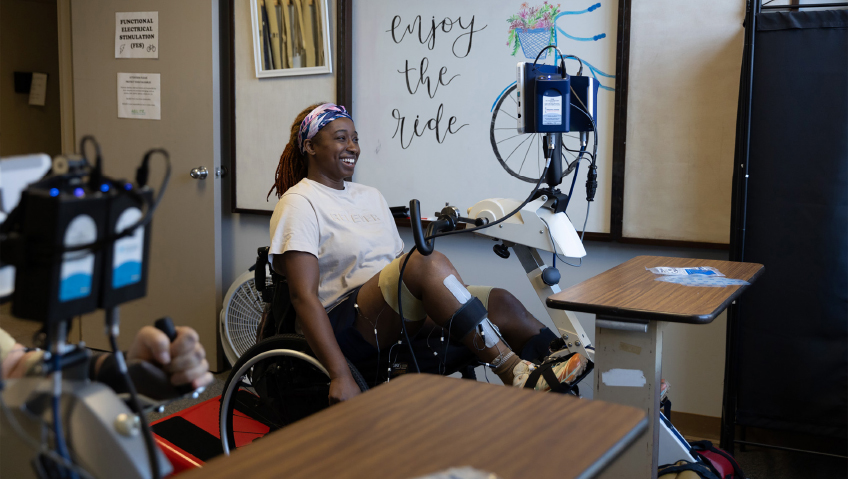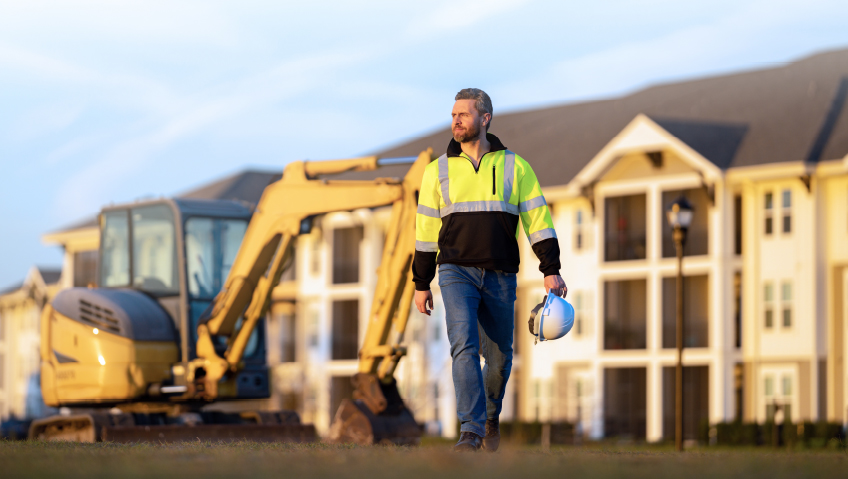Ability KC, Kansas City’s longest-standing comprehensive outpatient medical rehabilitation center, serves thousands of patients and their families every year. As a nationally accredited, innovative, and value-based rehabilitation medicine pioneer for individuals who have experienced a serious illness, injury, or disability, Ability KC offers a distinctive, individualized approach, supporting individuals across all ages through medical, educational, vocational, and quality of life therapies and programs.
The center helps with everything from assisting children with kindergarten transitions to helping adults relearn how to drive or return to work. Focused on igniting possibilities and building brighter futures, Ability KC is a leader in specialized rehabilitation and therapies, driving change that profoundly improves the quality of life for those it serves through a combination of traditional therapies with real-life experiences in home, school and work environments.
Stories of hope
“The transformative journeys of the individuals we serve, along with those of their families and caregivers, are truly remarkable,” says CEO Amy Castillo. “Their stories inspire hope, exemplifying what determination coupled with this unique model of care can do.”
Castillo highlights the center’s dedication to embracing innovations that address challenges and key changes necessary in U.S. healthcare, driven by scientific advances in research and technologies, consumer demands, and evolving service utilization. “Since 1947, our mission has been about looking at things differently from a strategic framework and the models of how care is delivered,” Castillo says. “We’re in the post-acute care space, meaning we don’t do inpatient care. If you think about the changes that have occurred since the pandemic and the necessity for more effective post-acute care, that’s where we’ve grown immensely.”
Holistic care
Unlike a traditional siloed approach in healthcare, Ability KC places an individual at the center of excellence model, considering all aspects of their goals integrating back into their homes and communities. “We’re focused on the whole person,” says Castillo. “When that person arrives, we think about all the facets of what that person needs support with. Often the people we support have the most complex conditions, and, in the United States, greatest healthcare spend.”
These individuals are not coming to Ability KC with just one health condition, she says. They often experience multiple conditions that span from physical, mental, behavioral to developmental.
A critical challenge in U.S. healthcare today is the transition from pediatric to adult care, often leaving patients searching for new healthcare resources. “Our model is focused on helping people through key transitions in life, ensuring they have the right resources to improve their quality of life,” Castillo explains. “We provide a value-based approach that addresses care gaps and enhances quality of life.”
Each year, as the demand for the center’s services grows, the team encounters individuals with increasingly complex injuries, illnesses, and disabilities, and thus, more complex medical needs. Ability KC has also experienced an increase in need from rural counties as far as western Kansas and central Missouri to southern Iowa and northern Oklahoma. “Our intensive and complex rehabilitation is designed to maximize care within one center yet extend services via technologies to homes and communities. Without this integrated care model, many of these individuals and their families would face the burden of traveling to multiple locations, often in different cities, for treatments, resulting in added expenses, inefficiencies, and fragmented care,” says Castillo.
“The reason that it’s so important to think about investing in and scaling post-acute care is because of the trend toward shorter hospital stays,” she explains. “Patients are being discharged earlier, which is not ideal, but it’s the reality, which can complicate their recovery,” she says. “Once they’ve been discharged, they come to Ability KC, where the center’s day-service model provides intensive, integrated rehabilitation for up to four to six hours each day, combining physical therapy, occupational therapy, speech rehabilitation, neuropsychology, specialty services, and medical management.” Ability KC ensures patients have the support they need, minimizing avoidable rehospitalizations or emergency room visits, and supporting the continuity of care with their physicians and teams.
International recognition
Accredited by CARF (the Commission on Accreditation of Rehabilitation Facilities), Ability KC is recognized nationally and internationally for its specialization in spinal cord injuries, traumatic brain injuries, stroke, and amputations.
How is Ability KC able to deliver this? “We support all the major healthcare systems not only in Kansas City but across Missouri and Kansas,” Castillo says. Whether treating a patient recovering from cancer, stroke, or a different condition, Ability KC adapts its model to meet each individual’s needs, focusing on improving quality of life.
Fostering educational support
“Education is a critical aspect of what we do,” says Castillo. The center works with children and families to navigate educational and healthcare challenges, from kindergarten transitions to high school reentry. “We work with a multitude of school districts to help children re-enter their education after an illness or injury, whether it’s a child aged five or 16. We focus on how they can integrate back to their school or into a workplace environment.”
“We also have a therapeutic preschool based on our founder, Mary Shaw Branton’s, vision,” says Janet Padley, Chief Impact Officer. “By combining therapy and education in one location, we can provide both physical and academic support.” This model extends beyond preschool to serve pediatric and adolescent patients in need of outpatient therapy.
“We focus on creating an integrated environment where special education teachers, physical therapists, and other specialists work together in one space to maximize the child’s development,” Castillo says. “We aim to eliminate the fragmentation of care, bringing everything under one roof.”
Non-profit with a purpose
While Ability KC is a non-profit, it operates with a focus on fiscal sustainability and continual reinvestment into the model of excellence and innovation. “Our financial model allows the center to focus on addressing gaps in care while adapting, navigating, and innovating,” Castillo says. “We’re committed to improving livability for our patients and ‘thrivability’ for our organization,” she adds. “Our mission is to build brighter futures for children and adults with disabilities, addressing complex healthcare needs to ensure people have a better quality of life.”
Both Castillo and Padley share a personal commitment to Ability KC’s mission. “We’re constantly focused on finding solutions for our patients,” says Castillo. “That’s what keeps us motivated.”
Padley agrees, noting that Ability KC’s innovative approach to patient care sets it apart in the healthcare field. “This is an organization that’s really thinking outside the box and doing what’s right,” she says. “As a nonprofit, we’re able to do what’s right for our patients, even when it’s not always reimbursed. What matters is the outcome for the individual. On a personal level, a human level, we all love working here. We’re all so passionate about it because we get to see people of all ages and see their outcomes and life changes.”
Universal Design and lifelong support
At Ability KC, Universal Design is central to its approach—creating environments that are inclusive, accessible, and usable for everyone. The center ensures patients are equipped with the technology and innovations they need to communicate and live more independently.
“People may be born with disabilities, or they may experience traumatic events, like strokes or amputations, that change their entire lives. People are often in a quandary when they’re discharged from the hospital,” says Shannon Lepper, Chief Operations Officer. “For most, leaving the hospital after a serious illness or injury is just the beginning of a long journey.”
“We help and serve as their navigator,” says Lepper. “People know they can come back to us through different stages of their life, not just immediately after an injury or illness. We’re going to be here for them throughout their journey.”
Commitment to excellence
The center’s commitment to excellence is reflected in its culture, which is staff-driven. “[We ask ourselves,] ‘How do we continue to grow as an organization and create?’ That’s a big piece of why our employee retention rate is close to 90 percent. We have about 300 employees, and the average tenure here is very long, which speaks to the strong culture we’ve built,” says Lepper.
With continuous professional development opportunities, and an open-door policy for employee feedback, Ability KC values its staff as its greatest asset. “When we invest in our employees, it benefits the entire community,” Castillo says.
As healthcare continues to evolve, Ability KC’s goal and practice grows ever more important. “The biggest element we’re focused on in our healthcare system is the way costs are covered,” says Castillo. “At times these services may not be covered for individuals—for example, adults with Medicaid. For us, this mission remains crucial. We’re focused on ensuring that rehabilitation therapies are covered for people so they can access them. We want to make sure that no one is left behind.”






